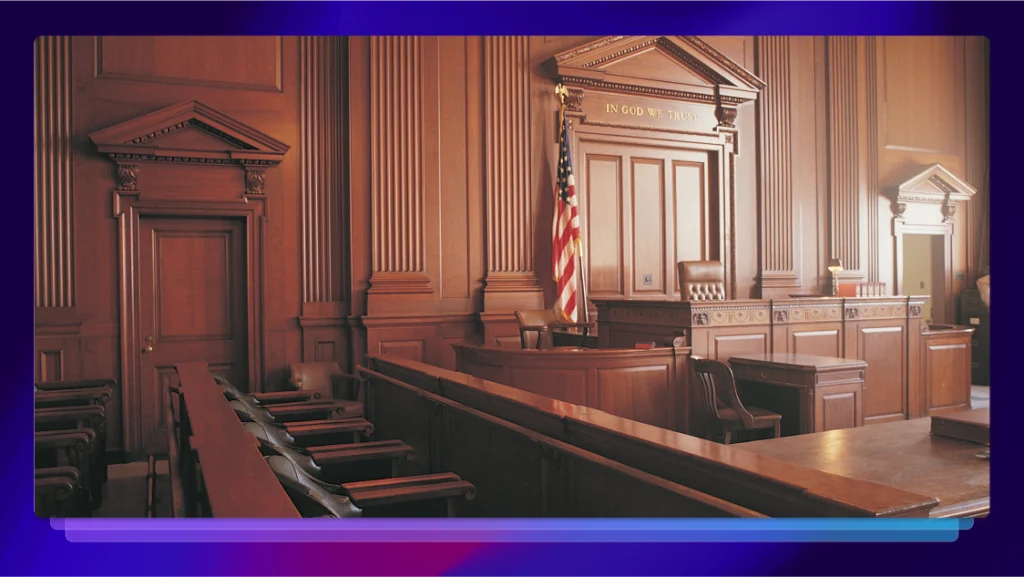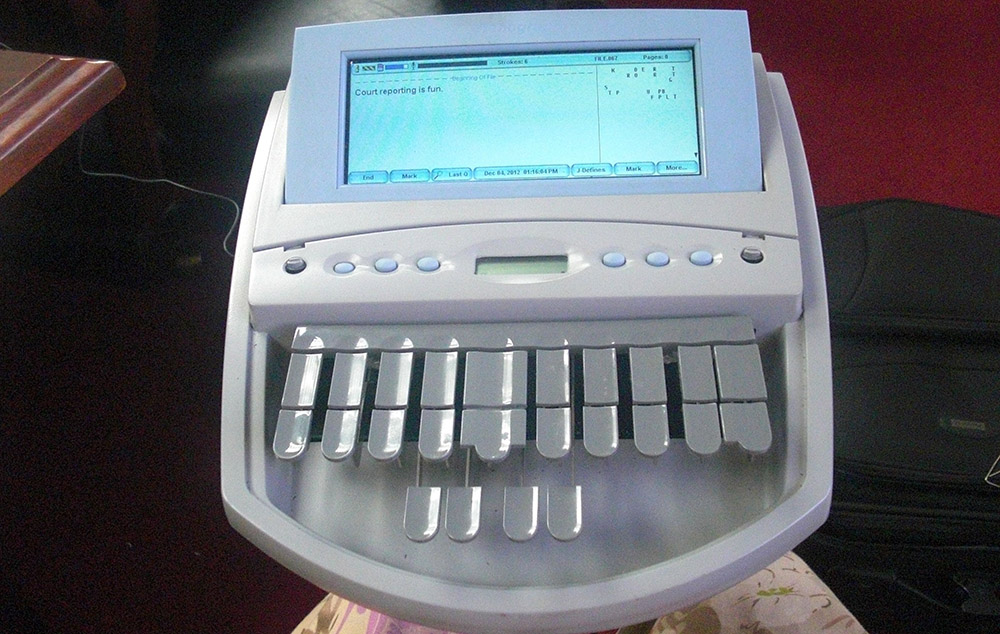Court Typist vs. Stenographer: Breaking Down the Key Differences
Court Typist vs. Stenographer: Breaking Down the Key Differences
Blog Article
Discovering the Day-to-Day Obligations of a Court Typist in the Judicial System
As you navigate the intricate globe of the judicial system, you may locate yourself curious regarding the role of a court typist. This placement is greater than just keying; it involves catching every word spoken throughout procedures with accuracy. Every day offers special challenges and obligations that are important for preserving the honesty of legal documents. Comprehending what a court typist does can disclose understandings right into the more comprehensive workings of justice. What does it take to succeed in this function?
Review of the Court Typist Role
As you enter the function of a court typist, you'll locate it is important to recognize the important duties entailed. You'll function as an essential web link in the judicial procedure, ensuring that all talked words throughout court process are precisely caught and documented. Your job supports the honesty of the lawful system, making your focus to information imperative.You'll operate customized transcription equipment, transforming audio recordings into created records. Knowing with lawful terminology and court treatments is essential, as you'll commonly encounter intricate language and jargon.You'll also need to keep privacy and manage delicate details with treatment. Your role needs you to function efficiently under pressure, usually with tight due dates, while remaining concentrated on producing clear, specific transcripts. As a court typist, you play an important duty in preserving the authorities record of court procedures, contributing significantly to the overall functioning of the judiciary.

Key Obligations of a Court Typist
While you'll often be focused on recording talked words during court procedures, your key duties as a court typist extend much beyond transcription. You'll prepare and preserve accurate records of court activities, guaranteeing they mirror every information of the procedures. You'll additionally layout papers, such as lawful briefs and summons, adhering to stringent standards and deadlines.In enhancement, you'll organize and handle case documents, making it easier for courts and lawyers to gain access to essential info swiftly. You're expected to check and edit transcripts for clarity and precision, which is crucial for the integrity of legal proceedings.Moreover, you'll function carefully with courts, clerks, and lawyers, keeping open interaction to address any type of inconsistencies or demands. Your function is vital in ensuring that the judicial process runs efficiently, providing a dependable written account of what takes place in the courtroom.
Crucial Abilities for Court Typists
As a court typist, you require to understand both typing speed and precision to stay on top of the demands of the court room. Experience with legal terminology is also crucial, as it guarantees you precisely catch the process. These abilities not just boost your efficiency yet likewise contribute to the general efficiency of the lawful process.
Entering Speed and Precision
Entering speed and accuracy are necessary skills that every court typist need to understand to guarantee the integrity and performance of lawful paperwork. You need to kind rapidly yet very carefully, as also minor mistakes can lead to considerable misconceptions in lawful contexts. A high keying speed allows you to stay on top of fast-paced court proceedings, ensuring that every word is recorded precisely. Exercising frequently can help you boost your rate, while concentrating on precision helps minimize errors. Using devices like dictation software program or message expanders can additionally improve your efficiency. Remember, your role is vital in maintaining precise records, so sharpening these skills not just benefits you but additionally sustains the whole judicial process.
Legal Terms Effectiveness
Grasping lawful terms is vital for court typists to assure reliable and precise documentation. You need to acquaint on your own with different legal phrases, lingo, and concepts frequently made use of in court procedures. This knowledge helps you record recordings and draft files with precision. When you recognize terms like "plaintiff," "offender," and "subpoena," you'll decrease the opportunities of mistakes that could jeopardize lawful proceedings.Additionally, exceling in lawful terms enhances your confidence while working alongside judges, lawyers, and various other attorneys. You'll locate it simpler to comply with conversations and accurately capture the significance of what's being claimed. court typist. Continual understanding and method will boost your skills, making you a valuable property in the judicial system
Tools and Technology Utilized by Court Typists
As a court typist, you depend on various tools and innovation to do your responsibilities effectively. You'll need vital typing devices, user-friendly software program applications, and audio transcription devices to maintain speed with the demands of your work. Let's discover exactly how each of these elements plays an important duty in your everyday jobs.
Necessary Typing Tools
While court typists count greatly on their skills, the best tools is important for efficiency and accuracy. To start with, a top notch keyboard is vital for fast and accurate keying, permitting you to equal court room process. Ergonomic styles can help prevent pressure during long sessions. A dependable computer with enough handling power assurances smooth operation, particularly when dealing with large papers (court typist). You'll also require a good printer for creating clear copies of records. Noise-canceling earphones can be advantageous during recordings, aiding you focus on audio clarity. In addition, an efficient work area and a comfy chair promote efficiency. With the appropriate tools, you can improve your keying capacities and sustain the judicial procedure effectively
Software Program Applications Made Use Of
To effectively transcribe court process, you'll count on a series of specialized software application applications designed for precision and rate. These programs commonly consist of recommended you read data processing software program, which aids you format records swiftly and appropriately. You'll also use legal-specific software application that aids in taking care of instance documents and preserving records, guaranteeing you can quickly access vital information.Another vital tool is real-time transcription software, allowing you to produce records as the process unfold. Additionally, you might make use of record management systems to organize and recover documents effortlessly. With these applications, you'll improve your performance and keep the high requirements needed in the judicial system, allowing you to concentrate on your typing abilities and the job available.

Audio Transcription Devices
Court typists often depend on a range of audio transcription devices to enhance the precision of their job. These tools aid you convert talked words right into composed text successfully. You might use software like Dragon NaturallySpeaking or Otter.ai, which supply voice acknowledgment abilities, permitting quick transcription. In addition, audio playback gadgets allow you to pay attention to recordings consistently, guaranteeing you catch every detail appropriately. Some court typists likewise make use of foot pedals, find more letting you control audio playback hands-free while you kind. This combination of modern technology not just speeds up the transcription process however additionally reduces mistakes. Familiarizing yourself with these devices can significantly enhance your productivity and the high quality of your transcriptions in the hectic judicial setting.
Challenges Encountered by Court Typists
Although lots of may check out the role of a court typist as uncomplicated, you'll promptly find that it comes with a special set of challenges. One significant obstacle is the fast lane of court process. You'll need to stay on par with rapid dialogues, which can be frightening, especially when several audio speakers are involved. In addition, the lawful jargon utilized in court can be intricate and strange, needing you to frequently find out and adapt.Another challenge is the stress of tight target dates. You usually need to produce transcripts swiftly, which can cause tension and possible mistakes. Maintaining focus for long periods is crucial, as even a momentary lapse can influence your work.Lastly, managing private info means you need to constantly focus on safety and discernment, including another layer of responsibility to your duty. Balancing these challenges becomes vital for anyone in the placement of a court typist.
The Relevance of Accuracy and Interest to Information
Accuracy and attention to detail are important for court typists, as even minor blunders can bring about substantial misconceptions in legal process. You are in charge of recording court hearings, legal records, and other essential information, where every word matters. A basic typo or misplaced punctuation can modify the meaning of a statement, potentially impacting the result of a case.When you concentrate on precision, you help maintain the honesty of the judicial system. Your meticulous work supports legal representatives, judges, and clients by providing exact and clear records. Interest to information additionally decreases the threat of expensive hold-ups and warranties that all parties entailed have accessibility to reliable files.
Career Course and Opportunities for Court Typists
Mastering precision and focus to information not only improves your present duty however also opens doors to different job courses for court typists. As you gain experience, you might consider advancing to placements such as legal secretary or administrative assistant in law practice, where your skills in transcription and paper administration will certainly be invaluable.You can additionally explore chances in court reporting, which commonly needs additional training however uses an opportunity to engage even more directly with court proceedings.If you enjoy the administrative side, placements in case monitoring or lawful research study might be an excellent fit.With further education, you might even come to be a paralegal, helping legal representatives with instance preparation.Networking with legal experts can help you uncover covert opportunities.Ultimately, your structure as a court typist equips you with abilities that are commonly relevant throughout the lawful landscape, leading the way for a satisfying career.
Frequently Asked Concerns

What Qualifications Are Needed to Become a Court Typist?
To become a court typist, you'll need strong keying abilities, understanding of lawful terminology, and focus to detail. A high school diploma is commonly required, and accreditations in transcription can boost your credentials.
How Does a Court Typist Deal With Secret Information?
You take care of private details by following rigorous procedures, utilizing safe and secure systems, and keeping discretion. You're educated to recognize sensitive data and assure it's saved and shared just with licensed workers, safeguarding the honesty of the info.
What Is the Normal Work Environment for Court Typists?
You'll normally find court typists in an official office setup, usually surrounded by lawyers. The atmosphere's generally silent, focused, and structured, allowing you to focus on transcribing and handling sensitive records successfully.
Are Court Typists Required to Take Dictation During Trial Runs?
Yes, court typists typically take dictation during trials. You'll require to listen very carefully, recording legal process accurately and effectively. Your emphasis and speed will certainly ensure that every information is recorded for authorities documents.
Exactly How Do Court Typists Handle Due Dates Throughout Busy Durations?
Throughout active periods, you prioritize jobs by organizing your workload and utilizing efficient keying methods. You established realistic deadlines, communicate with coworkers, and remain focused to assure all files are completed precisely and on time. While you'll frequently Discover More be concentrated on recording talked words during court proceedings, your crucial responsibilities as a court typist expand far beyond transcription. Entering speed and precision are necessary skills that every court typist need to master to guarantee the honesty and efficiency of legal paperwork. Understanding lawful terms is vital for court typists to assure precise and effective paperwork. Precision and focus to information are important for court typists, as also small mistakes can lead to substantial misunderstandings in lawful proceedings. court typist. To come to be a court typist, you'll require strong typing abilities, expertise of lawful terminology, and focus to information
Report this page